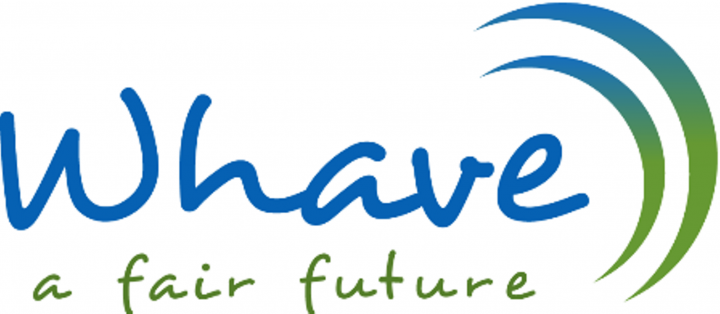Sustainable WASH Systems To build a strong base for achievement of SDGs 6.1 and 6.2, initially in five districts of Uganda: Nakaseke, Kamuli, Kumi, Kotido and Kaabong
Whave is implementing its Sustainable WASH Systems programme over a five year period, from 2016 through to 2021.
Whave ensures reliable operation by franchising local technicians on a performance-payment basis. The technicians receive a regular income from the service company in return for carrying out preventive maintenance Their monthly income reduces if breakdowns occur for longer than a day, such that they are incentivised to make sure of reliable operation. Whave acts as a model service company and sets a benchmark standard for reliability; it trains local service companies which operate under local government license, either independently or as franchisees. Communities are proving that they are willing to pay maintenance fees when the service provided is good enough.
Whave signs “reliability-assurance” service agreements with community WASH committees. These are business deals in which the village committee pays a bulk annual fee in return for preventive maintenance and assurance of reliable operation of their water source. If communities do not pay their full annual fee in one payment, the financial provision or “cap” for servicing reduces; higher fee levels achieve higher levels of service and higher caps. This approach is welcomed in practice, and allows the committee to perform its traditional task of ensuring universal access to water by all families, through welfare-orientated redistribution of the bulk annual fee amongst the members of the community.
Results: Sustained Reliability and Hygiene
This programme has been successful and the approach has been welcomed by villagers, their governing committees, local government authorities, and the relevant Ministry of the Ugandan government, which has asked for scaling of the approach in trial districts and studies on national roll-out. Results of the technicians’ performance-payment system has been successful in sustaining for three years more than 99% reliability in over 200 communities in five districts, compared to a baseline water source reliability estimated at between 50% and 70%. Hygiene levels have risen an average 16% from baselines, also sustained over three years, in comparison to the common occurrence of relapse.
Looking Ahead: Five Year Strategy
Building on these results, the Sustainable WASH Systems programme trains local service utilities in model districts. Cost information collected from Whave’s work to date has shown that each utility will require a customer base of at least 500 water sources (averaging 40 homes in each, such that direct project beneficiaries are 100,000 people). Funding is sufficient for the first year of the programme, but increased levels of funding are being sought to achieve this economy of scale for one, two, or three model service companies. The funding is required to tackle three major transitional issues:
i) Improvement of the technical quality of water installations.
ii) Collaborative establishment of regulatory services by local government, including establishment of local monitoring bodies.
iii) Social normalisation of tariff payment through radio and other media in order to bring water users and politicians at all levels to a common understanding.
Mission
The aim is to build a strong base for achievement of SDGs 6.1 and 6.2, initially in five districts of Uganda: Nakaseke, Kamuli, Kumi, Kotido and Kaabong. The programme addresses the fundamental causes of the persistent WASH crisis: lack of structures which ensure clean water systems are reliably operating every day, lack of willingness of most rural families to pay for water services, and endemic contamination of water, both at sources and in homes.Approach
The programme has also focused also on improving hygiene and sanitation conditions in engaged communities, recognising that reliable clean water must be hygienically handled in order for intended health benefits to be realised. Local technicians are financially rewarded for maintaining and improving hygiene levels in the communities they serve (tracked through regular hygiene surveys), including promotion and sale of innovative, low-cost hygiene/sanitation equipment, such as a modified clay drinking water storage pot with a tap that prevents contamination from scooping.Results
Results: Sustained Reliability and Hygiene This programme has been successful and the approach has been welcomed by villagers, their governing committees, local government authorities, and the relevant Ministry of the Ugandan government, which has asked for scaling of the approach in trial districts and studies on national roll-out. Results of the technicians’ performance-payment system has been successful in sustaining for three years more than 99% reliability in over 200 communities in five districts, compared to a baseline water source reliability estimated at between 50% and 70%. Hygiene levels have risen an average 16% from baselines, also sustained over three years, in comparison to the common occurrence of relapse. Looking Ahead: Five Year Strategy Building on these results, the Sustainable WASH Systems programme trains local service utilities in model districts. Cost information collected from Whave’s work to date has shown that each utility will require a customer base of at least 500 water sources (averaging 40 homes in each, such that direct project beneficiaries are 100,000 people). Funding is sufficient for the first year of the programme, but increased levels of funding are being sought to achieve this economy of scale for one, two, or three model service companies. The funding is required to tackle three major transitional issues: i) Improvement of the technical quality of water installations. ii) Collaborative establishment of regulatory services by local government, including establishment of local monitoring bodies. iii) Social normalisation of tariff payment through radio and other media in order to bring water users and politicians at all levels to a common understanding. The programme will include preparation of template contracts and development of experienced local professional capability, such that national roll-out becomes feasible at affordable cost.External Website(s)
Answer questions about the project
Adam Harvey
adam.harvey@whave.org
Filter / Tags
Market developmentOperation, maintenance and sustainable servicesPolitical processes and institutional aspectsSpecific to one or several countriesEnabling environment and institutional strengtheningOther funding source or unspecifiedPoliticians and local decision makersPractitionersLocal NGO
Related Countries
Uganda

Project location
